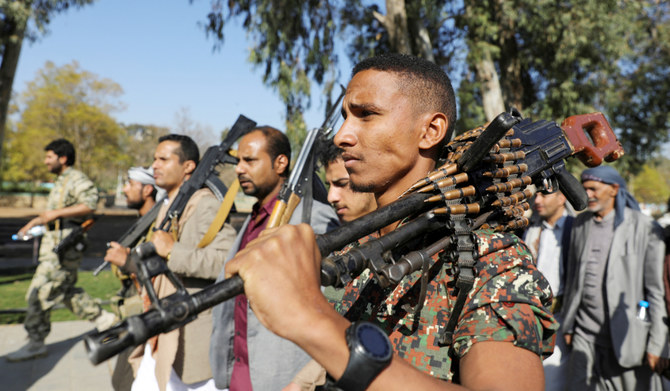CAIRO: Iranian-backed Houthi rebels in Yemen blew up a house Tuesday in a town southeast of the capital, Sanaa, killing at least nine people from the same family, officials and residents said.
This came a day after two Houthi fighters were killed in an ambush allegedly set up by the house’s owner, Ibrahim Al-Zalei.
The deceased — a set of parents and their seven children — were killed in the explosion, according to residents Ahmed Baydawy and Arman Mahmoud. Rescuers and civilians were trying to pull out others buried under the rubble, they said.
Baydawy and Mahmoud said the Houthis besieged the house and its surroundings in the district Radea, in the Bayda province early Tuesday, before booby-trapping the house and blowing it up, causing severe damage to neighboring buildings.
In a statement, the Houthi-run Interior Ministry said detonating the house was an “irresponsible reaction” by security forces who used “excessive force in an illegal way” while pursuing suspects behind Monday’s ambush. It said an investigation committee has been formed to bring those involved to justice.
The ministry didn’t provide a death toll following the house blowup, but confirmed fatalities.
Yemen has been engulfed in a civil war since 2014, when the Houthis captured the capital, Sanaa, and forced the internationally recognized government to flee to the south, and then later to Saudi Arabia.
The Houthis have imposed a repressive rule in Sanaa and other areas they control in Yemen. They have cracked down on any possible sign of rebellion among residents, jailing thousands and confiscating large swathes of land from those deemed dissents.
A Saudi-led coalition entered the war the next year to try to restore the government to power. The war has deteriorated largely into a stalemate and spawned one of the world’s worst humanitarian crises.
The war has killed more than 150,000 people, including fighters and civilians, and created one of the world’s worst humanitarian disasters, killing tens of thousands more.
Since the start of the Oct. 7 Israel-Hamas war, the Houthis have made headlines with their attacks on commercial ships in the Red Sea, causing trade that normally flows through the crucial corridor to reroute.

























